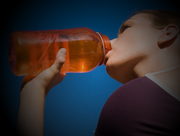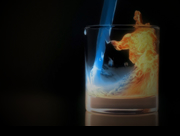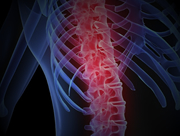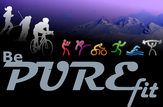If you kind of know you think you maybe should be doing the whole gels, bars, protein shakes thing, but really don't know where to start, read on for a straightforward explanation: WHAT IS SPORTS NUTRITION?!

SUGAR:
When you exercise, your body mixes oxygen (from breathing) and sugar - glycogen - stored in your bloodstream, muscles and liver - to create ENERGY. If you're exercising at a moderate aerobic level (jogging or cycling but still able to chat a bit), most people can sustain a steady output of energy for about 1.5 hours before they run out of stored sugar. At the point at which you run out of juice, one of 3 things can happen:
1. You 'BONK' completely - aka hitting the wall. This is where you collapse in a heap ... and hope a paramedic is nearby.
2. You carry on - but instead of using stored sugar, your body metabolises energy directly from your fat stores. Great - who doesn't want to burn fat? - but unless your body is very well trained (think elite endurance athletes) this can (a) feel horrible, and (b) you will be forced to slow down - probably quite a lot - because the chemical process is much slower.
3. You top up with sugars on the go, and keep going at a steady pace without ever letting your sugar stores run out.
SUMMARY: If you are exercising for more than 1.5 hours (and want to maintain a steady pace) you need to add SUGAR
HOW: In the form of energy drinks, gels, bars ... or any other sugary food you like (jelly babies are popular pick me ups, raisins or abricots are much healthier but can be hard to chew/digest). How much you need depends on your size, your effort level and how fit you are - but as a rule of thumb, aim to take on 200-300 calories per hour for anything over 1 hour's exercise.
When you exercise, your body mixes oxygen (from breathing) and sugar - glycogen - stored in your bloodstream, muscles and liver - to create ENERGY. If you're exercising at a moderate aerobic level (jogging or cycling but still able to chat a bit), most people can sustain a steady output of energy for about 1.5 hours before they run out of stored sugar. At the point at which you run out of juice, one of 3 things can happen:
1. You 'BONK' completely - aka hitting the wall. This is where you collapse in a heap ... and hope a paramedic is nearby.
2. You carry on - but instead of using stored sugar, your body metabolises energy directly from your fat stores. Great - who doesn't want to burn fat? - but unless your body is very well trained (think elite endurance athletes) this can (a) feel horrible, and (b) you will be forced to slow down - probably quite a lot - because the chemical process is much slower.
3. You top up with sugars on the go, and keep going at a steady pace without ever letting your sugar stores run out.
SUMMARY: If you are exercising for more than 1.5 hours (and want to maintain a steady pace) you need to add SUGAR
HOW: In the form of energy drinks, gels, bars ... or any other sugary food you like (jelly babies are popular pick me ups, raisins or abricots are much healthier but can be hard to chew/digest). How much you need depends on your size, your effort level and how fit you are - but as a rule of thumb, aim to take on 200-300 calories per hour for anything over 1 hour's exercise.

WATER:
Ever weighed yourself before and after a run? You'll probably notice you can lose an easy kg in a matter of minutes. Clearly, it's just lost water in SWEAT! Which you need to replace - either during, or after you exercise. Generally speaking, if you're exercising at a steady pace for less than an hour, you can probably manage not to drink on the hoof. But if you're out for longer, you MUST replace lost fluids as you go - to maintain output and avoid dehydration. It's easy to get bogged down in ml per hour per kg body weight per perceived exertion per degrees centigrade. But we're all different and we all sweat at different rates - so the rule of thumb is: LISTEN TO YOUR BODY. . If you're thirsty, drink more. If you're not, drink less. nb. It's possible to over hydrate while exercising - an unlikely but potentially life threatening danger. So, LISTEN TO YOUR BODY.
SUMMARY: If you're exercising at any level you need to replace lost fluids. If it's a short session, you can probably drink afterwards without reducing performance. If you're out for over an hour and/or it's hot, drink more.
HOW: Water is great! Water with added electrolytes (see below) and/or sugars (see above) is arguably better.
Ever weighed yourself before and after a run? You'll probably notice you can lose an easy kg in a matter of minutes. Clearly, it's just lost water in SWEAT! Which you need to replace - either during, or after you exercise. Generally speaking, if you're exercising at a steady pace for less than an hour, you can probably manage not to drink on the hoof. But if you're out for longer, you MUST replace lost fluids as you go - to maintain output and avoid dehydration. It's easy to get bogged down in ml per hour per kg body weight per perceived exertion per degrees centigrade. But we're all different and we all sweat at different rates - so the rule of thumb is: LISTEN TO YOUR BODY. . If you're thirsty, drink more. If you're not, drink less. nb. It's possible to over hydrate while exercising - an unlikely but potentially life threatening danger. So, LISTEN TO YOUR BODY.
SUMMARY: If you're exercising at any level you need to replace lost fluids. If it's a short session, you can probably drink afterwards without reducing performance. If you're out for over an hour and/or it's hot, drink more.
HOW: Water is great! Water with added electrolytes (see below) and/or sugars (see above) is arguably better.

SALTS / ELECTROLYTES:
Some people are super salty sweaters (they're the guys who have white tide marks on their shirts and shorts at the end of a session) and some people are sweet sweaters. Either way, sweat isn't just water. The classic first sign of a salt imbalance is cramp. Beyond that, electrolyte imbalances can send your systems seriously out of whack, with potentially serious consequences. If you're doing a short session, you probably don't need to worry too much - your body is clever at keeping the equilibrium, and you can replace your lost salts and minerals with a balanced diet. But if you're out on a long run, bike or hike, it's a good idea to ward off cramps by making sure you top up on salts and electrolytes as well as fluids. It might sound counter intuitive, but in the right doses, salts and sugars actually help you hydrate better.
SUMMARY: If you're out for over an hour, it's hot, or you're a sweaty monster, make sure your drinks are electrolyte balanced.
HOW: Energy drinks (powder you add to water) are scientifically researched to provide the best balance of salts, sugars and electrolytes. You can experiment with the concentration according to your preference, conditions, taste etc. Over the counter drinks - lucozade, powerade, are also pretty good. Water with a pinch of salt and a little bit of fruit juice is not a bad cheap version. If you want electrolytes but no added sugars, you can buy dissolvable electrolyte-only tablets such as nuun.
Some people are super salty sweaters (they're the guys who have white tide marks on their shirts and shorts at the end of a session) and some people are sweet sweaters. Either way, sweat isn't just water. The classic first sign of a salt imbalance is cramp. Beyond that, electrolyte imbalances can send your systems seriously out of whack, with potentially serious consequences. If you're doing a short session, you probably don't need to worry too much - your body is clever at keeping the equilibrium, and you can replace your lost salts and minerals with a balanced diet. But if you're out on a long run, bike or hike, it's a good idea to ward off cramps by making sure you top up on salts and electrolytes as well as fluids. It might sound counter intuitive, but in the right doses, salts and sugars actually help you hydrate better.
SUMMARY: If you're out for over an hour, it's hot, or you're a sweaty monster, make sure your drinks are electrolyte balanced.
HOW: Energy drinks (powder you add to water) are scientifically researched to provide the best balance of salts, sugars and electrolytes. You can experiment with the concentration according to your preference, conditions, taste etc. Over the counter drinks - lucozade, powerade, are also pretty good. Water with a pinch of salt and a little bit of fruit juice is not a bad cheap version. If you want electrolytes but no added sugars, you can buy dissolvable electrolyte-only tablets such as nuun.

PROTEIN:
You NEED protein to repair and build muscle. So if you've been exercising and your muscles are getting a pounding, protein shakes can be a great way to make sure you've topped up on the full range of amino acids. 'Science' says there's a window of opportunity of about 30 minutes after exercising where protein will be used most effectively to repair and rebuild muscles. A protein shake is a very quick, easy to digest way to help your body repair quickly. So if you're not sure that you're getting enough in your diet (most of us aren't) bring on the shakes. Alternatively / additionally you can head straight to the bbq and tuck into a steak and wings ...
There are lots of brands out there, offering similar products, so try a few and see what you like. We are big fans of TORQ - and reckon they make the best of the best in sports nutrition. 100% natural, vegan/vegetarian friendly, and super tasty too.
Get in touch for more info about sports nutrition for YOU.
You NEED protein to repair and build muscle. So if you've been exercising and your muscles are getting a pounding, protein shakes can be a great way to make sure you've topped up on the full range of amino acids. 'Science' says there's a window of opportunity of about 30 minutes after exercising where protein will be used most effectively to repair and rebuild muscles. A protein shake is a very quick, easy to digest way to help your body repair quickly. So if you're not sure that you're getting enough in your diet (most of us aren't) bring on the shakes. Alternatively / additionally you can head straight to the bbq and tuck into a steak and wings ...
There are lots of brands out there, offering similar products, so try a few and see what you like. We are big fans of TORQ - and reckon they make the best of the best in sports nutrition. 100% natural, vegan/vegetarian friendly, and super tasty too.
Get in touch for more info about sports nutrition for YOU.


 RSS Feed
RSS Feed
